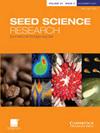Delayed germination of Brassica parachinensis seeds by coumarin involves decreased GA4 production and a consequent reduction of ROS accumulation
IF 1.9
3区 生物学
Q2 PLANT SCIENCES
引用次数: 7
Abstract
Abstract The plant allelochemical coumarin effectively inhibits the germination of Brassica parachinensis (B. parachinensis) seeds. Quantification of endogenous phytohormones showed that contents of abscisic acid (ABA), ABA glucose ester, gibberellin A20 (GA20), GA3, GA15, GA24, GA9 and GA4 were higher in germinating seeds than in seedlings. Moreover, the presence of coumarin significantly reduced the content of bioactive GA4 which is thought to positively regulate seed germination. Histochemical staining and spectrophotometry of reactive oxygen species (ROS) revealed that exogenous GA3 and GA4+7 could effectively promote the production of endogenous ROS during germination and that the GA synthesis inhibitor paclobutrazol could effectively inhibit production of ROS. Coumarin significantly inhibited the accumulation of ROS, especially superoxide anion radical (${\rm O}_2^{{\cdot}{-}} $). This inhibitory effect could be restored by the addition of exogenous GA3 and GA4+7. Coumarin also inhibited the activity of the ROS-degrading enzymes such as superoxide dismutase, catalase and peroxidase as well as β-amylase in seeds and seedlings. Taken together, we propose a model for the regulation of seed germination in B. parachinensis by coumarin, Gas and ROS, in which coumarin may delay seed germination by reducing endogenous GA4, thus decreasing the accumulation of ROS.香豆素作用下的伞芥种子延迟萌发涉及到GA4产生的减少和随之而来的ROS积累的减少
摘要植物化感物质香豆素能有效抑制白菜种子的萌发。内源激素的定量分析表明,发芽种子中脱落酸(ABA)、脱落酸葡萄糖酯、赤霉素A20(GA20)、GA3、GA15、GA24、GA9和GA4的含量高于幼苗。此外,香豆素的存在显著降低了生物活性GA4的含量,GA4被认为对种子发芽有积极调节作用。组织化学染色和活性氧分光光度法研究表明,外源GA3和GA4+7能有效促进发芽过程中内源性ROS的产生,GA合成抑制剂多效唑能有效抑制ROS的生成。香豆素显著抑制ROS的积累,特别是超氧阴离子自由基(${\rmO}_2^{\cdot}{-}$)。这种抑制作用可以通过添加外源GA3和GA4+7来恢复。香豆素还抑制种子和幼苗中ROS降解酶如超氧化物歧化酶、过氧化氢酶和过氧化物酶以及β-淀粉酶的活性。总之,我们提出了一个香豆素、气体和ROS调节副木种子发芽的模型,其中香豆素可能通过减少内源性GA4来延迟种子发芽,从而减少ROS的积累。
本文章由计算机程序翻译,如有差异,请以英文原文为准。
求助全文
约1分钟内获得全文
求助全文
来源期刊

Seed Science Research
生物-植物科学
CiteScore
3.60
自引率
4.80%
发文量
23
审稿时长
>12 weeks
期刊介绍:
Seed Science Research, the official journal of the International Society for Seed Science, is a leading international journal featuring high-quality original papers and review articles on the fundamental aspects of seed science, reviewed by internationally distinguished editors. The emphasis is on the physiology, biochemistry, molecular biology and ecology of seeds.
 求助内容:
求助内容: 应助结果提醒方式:
应助结果提醒方式:


